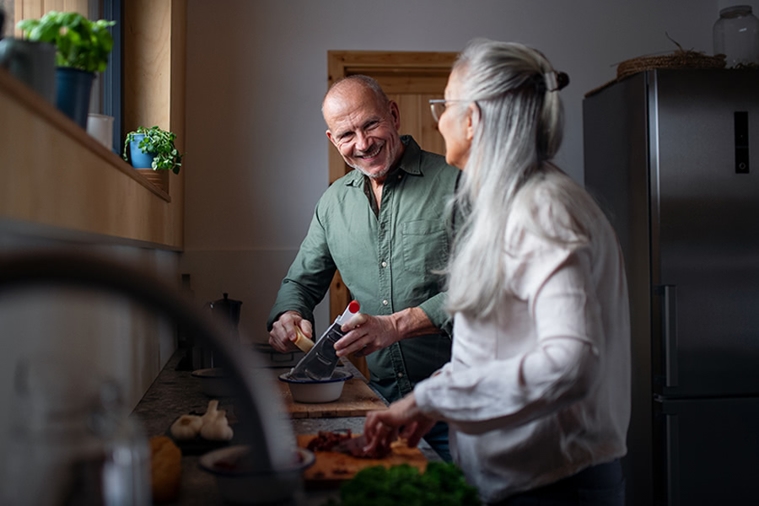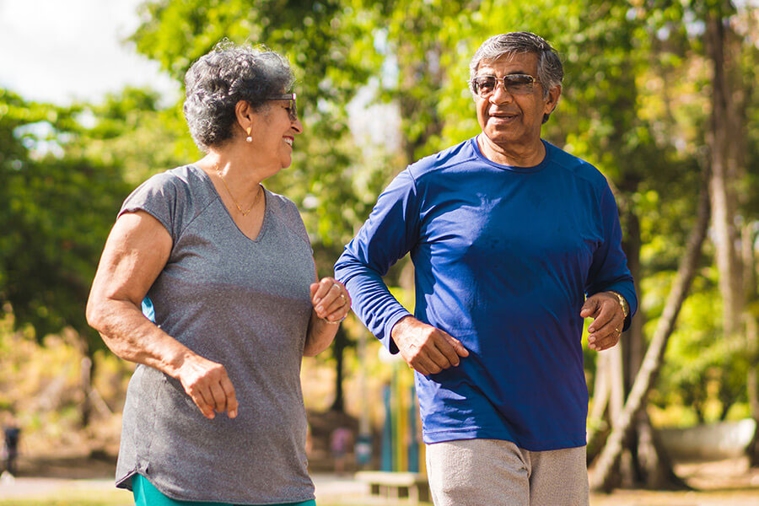
Give Your Immune System a Boost!
A network of organs, cells and proteins called the immune system serves as your body’s first line of defense against infection. A strong, healthy immune system is crucial for fighting unwanted bacteria and viruses. Follow these simple tips to give your immune health a big boost!
Exercise regularly—but also prioritize rest
Consistently moving your body can significantly reduce inflammation and help your immune cells regenerate more efficiently. One study found that just one session of moderate-intensity exercise boosts the effectiveness of vaccines in people with compromised immune systems.
Conversely, over-exercising can increase stress, which is linked with a weaker immune system. Aim for around 150 minutes of moderate exercise every week. Regular movement can also boost your mood, strengthen bones and improve cardiovascular health.
Practice good sleep hygiene
Research has shown a direct correlation between quality sleep and the immune system. In one study, adults who got less than six hours of sleep per night were much more likely to catch the common cold than those who got seven hours or more.
To maximize your sleep hygiene, turn off all electronics at least an hour before bedtime and sleep in a completely dark room. Try to go to bed around the same time each night and get up at the same time each morning—even on weekends.
Eat more plants and fermented foods
The antioxidants found in whole plant foods like fruits, vegetables, nuts and legumes can decrease inflammation by fighting free radicals. Besides harming your immune system, chronic inflammation is linked to other health conditions like heart disease, Alzheimer’s disease and some cancers.
The fiber in plants also helps to feed your gut microbiome, which has a direct impact on immunity. Fermented foods such as yogurt, sauerkraut and kefir help increase a type of beneficial gut bacteria called probiotics.
These bacteria help your immune cells tell the difference between normal cells and harmful ones. If you don’t get enough fermented foods in your daily diet, speak with your healthcare provider about taking a probiotic supplement.
Limit processed foods
There is a wealth of reasons to limit processed foods—avoiding added sugars and refined carbs lowers your risk of obesity, heart disease and Type 2 diabetes. Add to the list a boosted immune system.
Curbing your intake of processed foods decreases inflammation, which can increase your chances of avoiding sickness. Try to limit your sugar intake to less than 5% of your daily calories. For someone eating 2,000 calories, this equals out to less than two tablespoons of sugar per day.
Mind your micronutrients
Some specific vitamins and nutrients have a significant impact on strengthening immunity. If you aren’t getting the recommended daily intake for these nutrients in a daily diet, speak with your healthcare provider about possible supplementation.
- Vitamin C is perhaps the most well-known immune-boosting supplement. While taking the vitamin doesn’t necessarily prevent a cold, supplementing with vitamin C can help you get over a cold more quickly.
- Zinc can also be effective in shortening the duration of the common cold. In one review, a zinc supplement helped reduce the length of colds by 33%.
- Vitamin D deficiency is common—especially for people who live in overcast climates. Not getting enough vitamin D can increase the chance of getting sick. However, if you already have adequate levels of this vitamin, a supplement won’t provide added benefits. Always check with your healthcare provider before starting a vitamin D supplement.
Practice hand hygiene
While handwashing itself doesn’t specifically boost the immune system, washing your hands regularly is one of the most significant steps you can take to stay well. According to the Centers for Disease Control and Prevention, handwashing education can decrease the number of people who catch a respiratory illness by up to 21%.
Regularly cleaning your hands with soap and water or alcohol-based hand sanitizer is one of the best ways to prevent the spread of germs and avoid getting sick. Check out our top handwashing tips for COVID-19.



